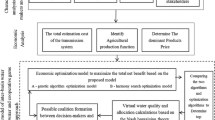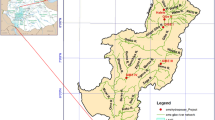Abstract
The virtual water strategy (VWS) provides an alternative modelling method to transport virtual water (VW) from water-rich regions to areas with water-scarce resources. This strategy is designed to balance the differences of regional water supplies, improve water-use efficiency, and ensure the environmental sustainability of water resources. However, the practical implementation of VWS still faces resistance due to a poor understanding of VWS and minimal pressure to make hard decisions about sharing water resources. Therefore, it is important to study the decision-making mechanism and behavioral motivation in the implementation process of VWS. Game theory has been extensively applied in economics, political science and natural science to predict and understand decision outcomes. Cost-benefit analysis and behavior incentives using VWS can also be accessed using game theory with a symmetric take out modelling approach. In this approach, efficient and acceptable methods to construct a VWS-based framework of VW trading can implemented. This study builds a semi-quantitative game model to analyze acceptance paradigms for economic development and trade patterns in sharing water. The optional strategies and relevant payoffs are analyzed to explore factors affecting the implementation of VWS. The results show that an equilibrium in which all areas share VWS is the optimal result. However, egoistic motivations, political pressures and risk of loss hinders decision making. Thus, to achieve mutual benefits within an interregional VWS framework, some external interventions are required. Interventions can include: reasonable incentive mechanisms for rewards or punishments, improving technologies and efficiency related to VW production, and promoting long-term trade cooperation between the regions. The uneven distribution and availability of freshwater globally dictates that the sharing and availability of water into the future will require VWS modelling and the political willingness to share resources.
Similar content being viewed by others
References
Allan JA (1998) Virtual water: a strategic resource. Global solutions to regional deficits. Ground Water 36(4):545–546
Alsamawi A, Murray J, Gomez-Paredes J, Reyes RC (2018) Exporting water from the desert? An analysis of the virtual water content of Saudi Arabian agricultural exports. Int J Water Resour Dev 34(2):292–304
Babu S, Mohan U (2018) An integrated approach to evaluating sustainability in supply chains using evolutionary game theory. Comput Oper Res 89:269–283
Barron EN (2013) Game theory: an introduction. Wiley, New Jersey
Brindha K (2017) International virtual water flows from agricultural and livestock products of India. J Clean Prod 161:922–930
Chen WM, Wu SM, Lei YL, Li ST (2017) China’s water footprint by province, and inter-provincial transfer of virtual water. Ecol Indic 74:321–333
Chouchane H, Krol MS, Hoekstra AY (2018) Virtual water trade patterns in relation to environmental and socioeconomic factors: a case study for Tunisia. Sci Total Environ 613-614:287–297
Gao Y, Li Z, Wang FM, Wang F, Tan RR, Bi J, Jia X (2018) A game theory approach for corporate environmental risk mitigation. Resour Conserv Recycl 130:240–247
Hoekstra AY (2013) The water footprint of modern consumer society. Routledge, London
Hoekstra AY, Chapagain AK, Aldaya MM, Mekonnen MM (2011) The water footprint assessment manual: setting the global standard. Earthscan, London
Jones AJ (2000) Game theory: mathematical models of conflict. Woodhead Publishing, Cambridge
Madani K (2009) Game theory and water resources. J Hydrol 381:225–238
Nash J (1950) Equilibrium points in n-person games. Proc Natl Acad Sci USA 36(1):48–49
Peters H (2015) Game theory: a multi-leveled approach. Springer Texts in Business and Economics, Heidelberg
Qu S, Liang S, Konar M, Zhu ZQ, Chiu ASF, Jia XP, Xu M (2018) Virtual water scarcity risk to the global trade system. Environ Sci Technol 52(2):673–683
Rusch H, Gavrilets S (2017) The logic of animal intergroup conflict: a review. J Econ Behav Organ. https://doi.org/10.1016/j.jebo.2017.05.004
Sechi GM, Zucca R, Zuddas P (2013) Water costs allocation in complex systems using a cooperative game theory approach. Water Resour Manag 27(6):1781–1796
Seekell DA, D'odorico P, Pace ML (2011) Virtual water transfers unlikely to redress inequality in global water use. Environ Res Lett 6(2):1–6
Wallerstein I (2004) World-systems analysis: an introduction. Duke University Press, Durham/London
Wang JD, Fang KJ, Yang YH, Shi YC, Xu DQ, Zhao SS (2018) A game theory based interaction strategy between residential users and an electric company. J Electr Eng Technol 13(1):11–19
Weiss EB, Slobodian L (2014) Virtual water, water scarcity, and international trade law. J Int Econ Law 17(4):717–737
Wichelns D (2015) Virtual water and water footprints do not provide helpful insight regarding international trade or water scarcity. Ecol Indic 52:277–283
Wichelns D (2017) Volumetric water footprints, applied in a global context, do not provide insight regarding water scarcity or water quality degradation. Ecol Indic 74:420–426
WWAP (2016) The United Nations world water development report 2016: water and jobs. UNESCO, Paris
WWAP (2018) The United Nations world water development report 2018: nature-based solutions. UNESCO, Paris
WWAP (World Water Assessment Programme) (2015) The United Nations world water development report 2015: water for a sustainable world. UNESCO, Paris
Xie SY (2002) Economic game theory. Fudan University Press, Shanghai (In Chinese)
Zhao X, Liu JG, Liu QY, Tillotson MR, Guan DB, Hubacek K (2015) Physical and virtual water transfers for regional water stress alleviation in China. Proc Natl Acad Sci USA 112(4):1031–1035
Zhao X, Liu JG, Yang H, Duarte R, Tillotson MR, Hubacek K (2016) Burden shifting of water quantity and quality stress from megacity shanghai. Water Resour Res 52(9):6916–6927
Zhi Y, Hamilton PB, Zhi CY (2015) Analysis of virtual water consumption in China: using factor decomposition analysis based on a weighted average decomposition model. Water Environ J 29(1):61–70
Zhi Y, Yang ZF, Yin XA, Hamilton PB, Zhang LJ (2016) Evaluating and forecasting the drivers of water use in a city: model development and a case of Beijing. J Water Res Pl-ASCE 142(1):04015042
Zomorodian M, Lai SH, Homayounfar M, Ibrahim S, Pender G (2018) Development and application of coupled system dynamics and game theory: a dynamic water conflict resolution method. PLoS One 12(12):e0188489
Acknowledgements
The authors are indebted to the Project of Humanities and Social Sciences of Ministry of Education of China (No. 16YJC790510), the Science and Technology Foundation of Guizhou Province (No. QKHJC20161034), the Canadian Museum of Nature Research Advisory Council Fund (2017–2020) and the Scientific Research Foundation for the Talents by Guizhou University (No. 2015003) for their financial support.
Author information
Authors and Affiliations
Corresponding author
Ethics declarations
Conflict of Interest
The authors declared that they have no conflicts of interest to this work.
Electronic supplementary material
ESM 1
(DOCX 18 kb)
Rights and permissions
About this article
Cite this article
Zhi, Y., Hamilton, P.B., Wang, X. et al. Game Theory Analysis of the Virtual Water Strategy. Water Resour Manage 32, 4747–4761 (2018). https://doi.org/10.1007/s11269-018-2081-7
Received:
Accepted:
Published:
Issue Date:
DOI: https://doi.org/10.1007/s11269-018-2081-7




